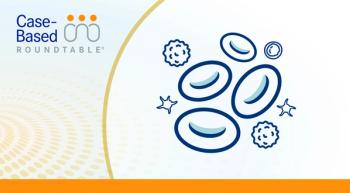
Targeted Therapies in Oncology
- March 1, 2023
- Volume 12
- Issue 3
Antitumor Activity and BTK Degradation Is Observed With NX-2127 in R/R CLL
Acquired resistance to BTK inhibitors is a new and growing challenge in the treatment of CLL and dual resistance to BTK and BCL2 is occurring in more patients, according to Lindsey Roeker, MD.
The use of a first-in-class Bruton tyrosine kinase (BTK) inhibitor, NX-2127, led to robust BTK degradation and a decrease in B-cell activation in patients with relapsed or refractory chronic lymphocytic leukemia (CLL) and B-cell malignancies, according to results of a phase 1 trial (NCT04830137).1 The objective response rate (ORR) in this heavily pretreated population was 33% (95% CI, 12%-62%) with a median follow up of 5.6 months (range, 0.3-15.7 months).
“Acquired resistance to BTK inhibitors is a new and growing challenge in the treatment of CLL and dual resistance to BTK and BCL2 is occurring in more patients,” Lindsey Roeker, MD, said during a presentation of the study during the Oncology Town Hall™ Primary Investigators Present Advancement in the Management of CLL meeting, sponsored by Physicians’ Education Resource®, LLC.2,3
In the dose escalation portion of the trial, oral daily dosing ranged from 50 mg (dose level 1) to 300 mg (dose level 3). Objectives were to determine safety and tolerability and to identify the maximum tolerated and biologically active doses.
“The phase 1a dose escalation portion is ongoing at the 100-mg dose levels for other histologies,” Roeker said. These histologies include diffuse large B-cell lymphoma (up to 20 patients), mantle cell lymphoma, mantle zone lymphoma, and Waldenstrom macroglobulinemia (up to 20 patients), and follicular lymphoma (up to 20 patients).
Fifty-four patients were screened and 36 patients were assigned to a cohort of 100 mg (n = 22), 200 mg (n = 8), and 300 mg (n = 6). Eighteen patients discontinued treatment and reasons for discontinuation include disease progression (n = 7), adverse event (n = 8), or other (n = 3). The rest of the patients continued on treatment (n = 18).
The median age of patients with CLL (n = 23) was 75 years (range, 61-90) and 60.9% were male. Median age and sex distribution were similar in the overall population (n = 36). For the CLL population, 100% were treated with a previous BTK inhibitor and 78.3% were treated with a BTK and BCL2 inhibitors.
“Thirty percent of the CLL population were refractory to covalent and noncovalent BTK inhibitors, as well as BCL2 inhibitors,” Roeker said. BTK mutations were present in 48% of the patients with CLL.
Regarding safety, the most common adverse events (AEs) were fatigue (58%), neutropenia (38.9%), confusion (27.8%), thrombocytopenia (25%), and hypertension (25%). One dose-limiting toxicity, cognitive disturbance, was observed at the 300-mg dose and maximum tolerable dose was not reached.
When safety was stratified by dose, the 100-mg dose (n =22) emerged as the most optimal with fatigue (59%), anemia (27%), neutropenia (23%), and thrombocytopenia (23%) observed with similar frequency.
The objective response rate (ORR) in disease evaluable patients (n = 15) was 33% (95% CI, 12%-62%) with one-third of patients (33.3%) experiencing a partial response, one-third (33.3%) experiencing stable disease, and 13.3% experiencing disease progression. After a median follow-up of 5.6 months (range, 0.3-15.7 months), 9 patients discontinued treatment because of AEs (n = 5) and 2 discontinued because of progression.
Daily treatment with NX-2127 led to sustained suppression of BTK (CD19+), according to flow cytometry assay and investigators noted a robust decrease of plasma CCL4 by cycle 1, day 8. Suppression was maintained through cycle 2, day 1.
“These early phase 1 data demonstrate the immunomodulatory activity with BTK degradation and clinically meaningful responses independent of prior treatment or BTK mutational status,” concluded Roeker.
REFERENCES:
1. Roeker L. Novel BTK Degrader, NX-2127, in relapsed/refractory CLL and B-cell malignancies. Oncology Town Hall™. Primary investigators present key abstracts in the management of CLL. Accessed January 30, 2023. https://bit.ly/3HVdyZH
2. Mato AR, Roeker LE, Jacobs R, et al. Assessment of the efficacy of therapies following venetoclax discontinuation in CLL reveals BTK inhibition as an effective strategy. Clin Cancer Res. 2020;26(14):3589-3596. doi:10.1158/1078-0432.CCR-19-3815
3. Lew TE, Lin VS, Cliff ER, et al. Outcomes of patients with CLL sequentially resistant to both BCL2 and BTK inhibition. Blood Adv. 2021;5(20):4054-4058. doi:10.1182/bloodadvances.2021005083
Articles in this issue
almost 3 years ago
Streamlining NGS Testing Process Improves Turnaround Time in NSCLCalmost 3 years ago
HRD Biomarker Predicts Response to Neoadjuvant Chemotherapy in TNBCalmost 3 years ago
AVO Triplet Regimen Continues to Show Durable Responses in High-Risk CLLalmost 3 years ago
Responses, Increased Resectability Are Observed With SHR-1701 in NSCLCalmost 3 years ago
Use of ctDNA Will Make Inroads in 2023 and Beyondalmost 3 years ago
Anti-HER2 Agents Gain Ground in Colorectal Cancer


















